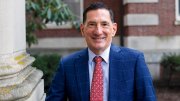From the first introduction of Elena Kagan, J.D. ’86, the former dean of Harvard Law School who was nominated to the post of U.S. solicitor general in January, students cheered for the woman who as dean did so much to improve student life.
Kagan’s advice to the class of 2009 centered on the importance of loving one’s work. She has "a three-part test for whether a job is worth doing...,” she said. “First, does the job challenge you intellectually? Does it make you stretch your mind? Does it make you think hard every day…?” Second, "Do I feel as if I am contributing something, making a difference in the world?” And third, “Can I just not wait to get to work in the morning?”
Her advice was attuned to the effect of the current economic downturn on the school’s imminent graduates. “I don't think there has been a class at Harvard Law School for many, many years that has had some of the difficulties that this class has had: in terms of jobs and financial security,” she said. “Of course, you are still much more lucky than most people in the world and the difficulties that you've had don't compare with the difficulties that many people out there are having. And yet in comparison with some of the classes that have gone before, you have had a harder time of it. And you've faced somewhat more constricted choices.”
But she emphasized that “the greatest challenges produce the biggest opportunities.” She recalled a commencement speech given by Franklin Delano Roosevelt during the Great Depression, “an even tougher period than exists right now.” Roosevelt told the class of 1932, "Yours is not the task of making your way in the world, but the task of remaking the world which you will find before you.” For the class of 2009, Kagan said, “within all this difficulty there is also incredible potential and promise, and yours is the task of finding that promise by remaking the world”—in that process, “young Harvard-trained lawyers are going to play an absolutely pivotal role.”
Furthermore, Kagan, who as dean was instrumental in increasing the amount of pro bono work performed by students, said she sees a silver lining in the current economic crisis, in that it will force graduates who might otherwise have succumbed to the lure of enormous salaries and bonuses to ask themselves, “What direction do I really want to go in? Where do I really want to serve? How can I really make a difference? And what will make me get up every morning with that smile on my face?”
Kagan proffered two other nuggets of wisdom: make friends along the way and keep them, and listen: “The most important talent you can cultivate is a talent for listening. Because nobody ever learned anything while they were talking.”
Ultimately, she told the graduating class, the most important question is “whether you will use all of that power and influence and impact for good purposes: to advance the rule of law; to promote justice; to serve people other than yourself; and to enhance human well-being; that's what I hope for you, and knowing you as I do, that is what I expect of you. Fellow graduates, all my warmest congratulations and all my deepest love."
The ceremony was not without lighter moments. The school’s Sacks-Freund Award for Teaching went to Gottlieb professor of law Elizabeth Warren, an expert on bankruptcy, consumer debt, and commercial law who currently oversees the release of funds from the government’s Troubled Asset Relief Program (TARP). Speaking of her own love of her job, she said, “So many mornings over the last three years, I lie in bed and I think, 'Ah, today I'll begin by roasting a few students.' It always makes me smile. In other words, I love what I do.” Dean of students Ellen Cosgrove, whom the class of 2009 chose for the Suzanne Richardson Staff Recognition Award, noted during her acceptance speech that she was “the only woman on this stage over the age of 40 who is not running a major aspect of our federal government. We have our economy,” she said, referring to Warren, “and our legal system,” referring to Kagan—“and I do the midnight pancake breakfast.”





